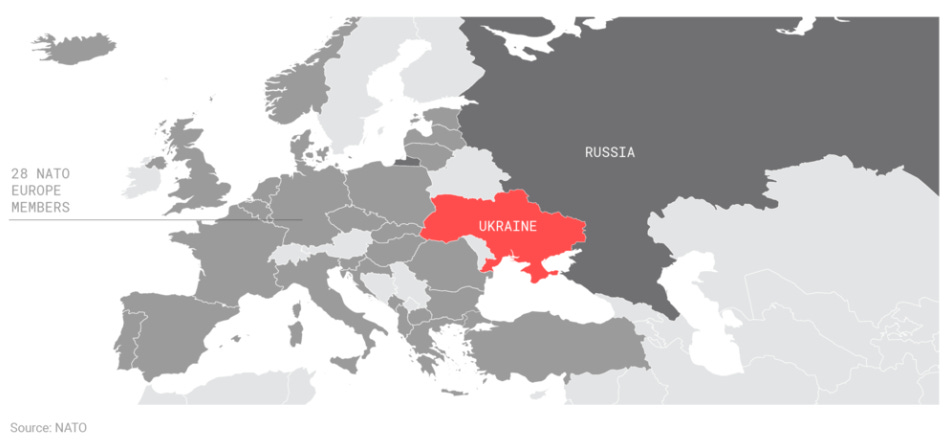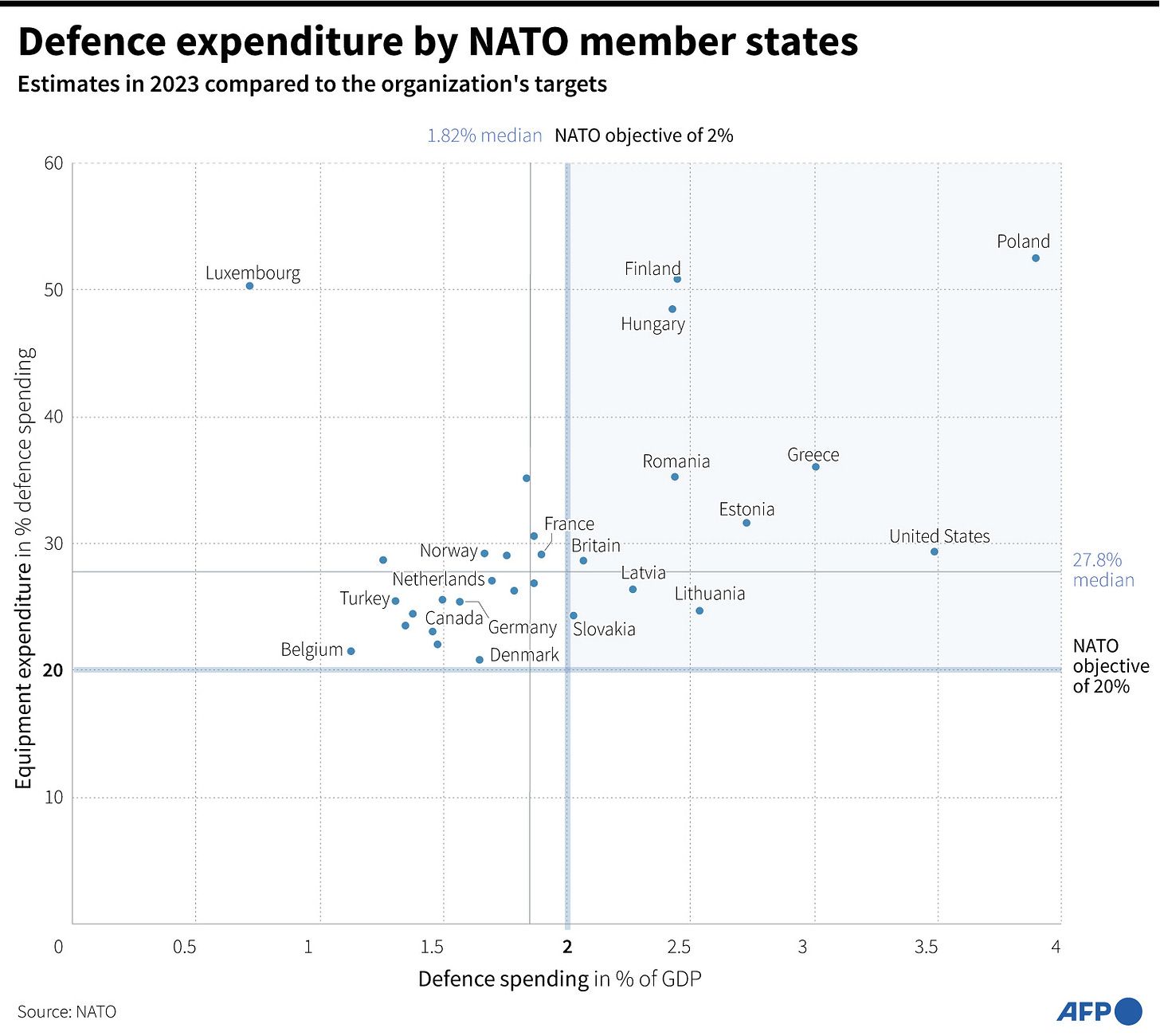I understand the desire for Ukraine - and others for that matter - to be part of NATO. I also understand why the frontline states in Central Europe such as the Baltics republics and Visegrad Group would like Ukraine in as well. Defense in depth and long fronts are a thing.
As much as I can sympathize with the above, I also understand the reasons that Ukraine and other nations may never be right for NATO membership, or at best be a decade or two out. Single points of failure triggers to another world war - where every new member state increases the aggregate risk to all members - is not a minor thing to consider.
There is also the very real fact that Ukraine is in a war right now, for her an existential war with Russia. This CNN article is a perfect example of some of the absolutely foolish questions people are even considering right now. I’m not even going to quote from it as there are dozens like it out as the NATO summit is going on. It is a waste of your time.
You don’t need to be an international lawyer to understand that if Ukraine were to join NATO in the middle of a war, then congrats - most of Europe and North America are at war. As history tells us, when Europe and North America goes to war, eventually the world joins in.
For today’s post, I’d like to pull some quotes from a superb Financial Times article, NATO’s dilemma: what to do about Ukraine’s bid to join?
Membership represents the long-term security that Kyiv wants and was promised 15 years ago. But Russia’s war has complicated things
When Ukrainian President Volodymyr Zelenskyy strides into Nato’s annual summit in Vilnius on Wednesday, his country will have been fighting a full-scale war of survival against Russia for 503 days.
2008, in the last year of the Bush-43 administration. The year it looked like we had Iraq stabilized yet were already planning to take the keys in Afghanistan back from NATO after the alliance culminated in the summer of 2007.
The year of imperial overreach in denial;
It was over breakfast in Bucharest in 2008 that the seeds of Nato’s current dilemma were sown.
At an early morning meeting on the second day of the alliance’s summit that year, then secretary-general Jaap de Hoop Scheffer met with US president George W Bush and his French and German counterparts Nicolas Sarkozy and Angela Merkel.
The outcome of that breakfast, and a result of Merkel softening her opposition to Bush’s proposal to offer membership to Ukraine and Georgia, was a statement by the entire Nato alliance.
Both countries “will become members of Nato”, it said, without providing a timeline. That declaration, at the same time both unequivocal and non-committal, was hailed as a major achievement. It has since sunk into infamy.
Amazing how people forget that other nations get a vote. Your actions will cause reactions by those who either think they will benefit from or be endangered by them. Roll that simple context in to the 1,000 year record of people west of the Vistula misreading Russia and you have this;
Four months later Putin’s tanks rolled into northern Georgia. In 2014 his special forces annexed Ukraine’s Crimean peninsula. Nato, as Putin knew well, refuses to accept new members with “frozen conflict” on their territory. Aside from condemnatory rhetoric, Nato did little to punish Moscow. Putin, who had been present at the Bucharest summit as a guest, had called Nato’s bluff.
Putin was right. No one, will join NATO who has border disputes or are best known for their globe-spanning corruption.
NATO and the USA’s natsec “blob” was, again, wrong. Being wrong isn’t the problem. It is an imperfect business where mistakes are going to be made. The important thing is to learn from them and if the same people and institutions are perpetually wrong, you get new people and institutions to help you make decisions. That is the danger. It isn’t that we “remember everything but learn nothing” it is more that we “remember only what confirms our priors and only learn to try harder next time.”
Case in point;
“The sole task here [in Vilnius], and one that all allies agree on, is that we left grey areas on the map 15 years ago which Putin took advantage of, and now we need to make sure there is no more grey,” says one senior Nato diplomat. “It is about making crystal clear where the lines are.”
Putin did not take advantage of anything. NATO just made an arrogant mistake that drove Putin to do what Russian has done for 1,000 years - try to secure the approaches to the core of Russia. Hell, that is what I would do if I were Russian, and I don’t even have a PhD. Geography, history, and the Russian view of the world is not hidden knowledge.
Instead of being patient and keeping their cards close to the chest, in 2008, the Smartest People in the Room™ decided to select the “Leroy Jenkins COA” and here we are.
Back to 2023;
While the formal promises are not yet agreed or stated publicly, officials involved in the discussions tell the FT that they will centre on codifying existing military supplies and making a clear pledge that they will continue. Plus there will be guarantees on the training of Ukrainian troops, intelligence-sharing and assistance with defence policy reforms. There is also likely to be a multilateral declaration of some kind with countries making individual pledges.
Nato will also elevate the existing Ukraine-Nato commission to a council. That gives Kyiv an equal seat at the table with Nato members and allows it to call meetings for “crisis consultations”. The inaugural meeting will take place on Wednesday in Vilnius.
This makes sense. 18-months in to the Russo-Ukrainian War, like it or not NATO is engaged in a proxy war with Russia. We are in, if not through, that transition period where we have to be “in it to win it” even if we will not put boots on the ground. Don’t forget though, “win” will be as defined by Kyiv, not Brussels or DC.
But sceptics, such as Estonia’s prime minister Kaja Kallas, warn that they “blur the picture” and distract from Nato membership. Kallas likes to joke that to a non-native English speaker, “assurances”, “commitments” and “guarantees” can pass for synonyms, whereas only Article 5 can be relied upon.
Ukraine is understandably wary of paper promises. In 1994, under an agreement called the Budapest Memorandum, it gave up its arsenal of Soviet-era nuclear weapons, then the third-largest in the world, in return for security assurances from Russia, the US and the UK. These counted for nothing in 2014 and 2022.
True. I don’t blame them. There is a history here.
The below is a good example for what a post-war non-NATO Ukraine should think about benchmarking as a start to a longer conversation.
Some officials have pitched the commitments as an “Israeli model” akin to the overt military support Washington provides to the Jewish state.
The US currently commits to making sure Israel has a “qualitative military edge” in the Middle East and signs memorandums of understanding every 10 years. Officials envision Ukraine could have something similar, putting the country’s defences on a suitable footing — it would be impossible to commit to parity with Russia.
Think a little bit of Israel flavored with the Swiss model and Singapore attitude.
One big thing that the war has changed, according to Tsahkna, the Estonian minister, is Ukraine’s place in the western world. Before the invasion, doubts remained about whether Ukraine had fully shed its Soviet past — whether it was still in Moscow’s orbit. “Now, it’s clear for generations, the Ukrainian nation has made their own choice,” he says. “Our question is whether we ask them to join. They are sharing the same values . . . They belong to us, to the west.
Yes, aspirationally, but not quite. Ukraine is more Russian than “Western.” Somewhere between Central European Slavic and Russian - but if you define “Western” as high democratic principals and manageable levels of corruption, then yes.
I don’t think Ukraine once at peace will turn in to Finland over night, but if we could get somewhere near Bulgaria … then yes. That would do for 2035.
There is a long way to go to get there. It will be even further until you can convince an insurance salesman from Ames, Iowa that his 18-yr old daughter should be ordered to help defend the suburbs of Kharkiv - which is what NATO membership obligates our nation to do.
Until then, I would be more interested in the existing NATO nations to focus on moving in to the upper right quadrant.






Great article Sal. Had no prior knowledge of the 2008 events. Very critical events at that.
Of course you could also plot spending against 'distance from Russia'.
Or plot spending against 'years since Russian conflict'.